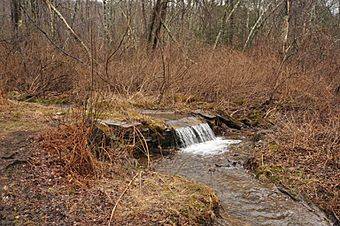Sharpe's Trout Hatchery Site facts for kids
Quick facts for kids |
|
|
Sharpe's Trout Hatchery Site
|
|
 |
|
| Location | Valley Falls Park, Vernon, Connecticut |
|---|---|
| Area | 1 acre (0.40 ha) |
| Built | 1871 and 1874 |
| Architect | Christian Sharps |
| NRHP reference No. | 97000274 |
| Added to NRHP | March 31, 1997 |
The Sharpe's Trout Hatchery Site is a special place in Vernon, Connecticut. It covers about 1 acre (0.40 ha) and used to be a fish farm for trout. A man named Christian Sharps started this hatchery in 1871. Sadly, it was closed after he passed away in 1874. Today, you can find the remains of this old hatchery inside Vernon's Valley Falls Park. It was even added to the National Register of Historic Places in 1997 because of its history.
History of the Fish Hatchery
Christian Sharps was famous for inventing a type of gun called a breech-loading rifle in 1848. This rifle was known for shooting very accurately over long distances. It was even used by soldiers during the American Civil War. After the war, fewer people needed these rifles, so Sharps looked for a new business idea.
At that time, the number of native trout fish in the country was going down. This was partly because too many fish were being caught. Also, rivers were being blocked by dams for factories. Sharps saw an opportunity to help. He bought a large piece of land, about 150 acres (61 ha), which included an old mill and a pond. This spot in southern Vernon was perfect for raising fish.
On his new land, Sharps built a small cabin and several ponds. He also created special structures to control the water flow. He even built up dirt walls, called berms, to protect the hatchery from floods. Sharps hoped to produce 300,000 fish each year. He even planned to grow his business to make 500,000 fish annually!
Sadly, Christian Sharps died from tuberculosis in 1874. This happened before he could really see his fish farm succeed. His family moved away from Vernon, and the land went back to its previous owner. Later, in 1962, the Vernon Fire District bought the property. The old mill pond was cleaned out and turned into a fun area for people to visit. Today, you can still see parts of the old hatchery. These include stone wall foundations, small dam sections that once controlled water, and the earthen berms.



